This note is obtained from station B crazy God speaking Java
What is a design pattern

The significance of learning design patterns
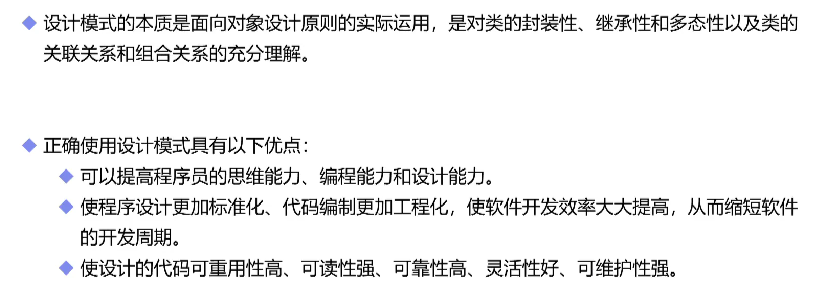
GoF23
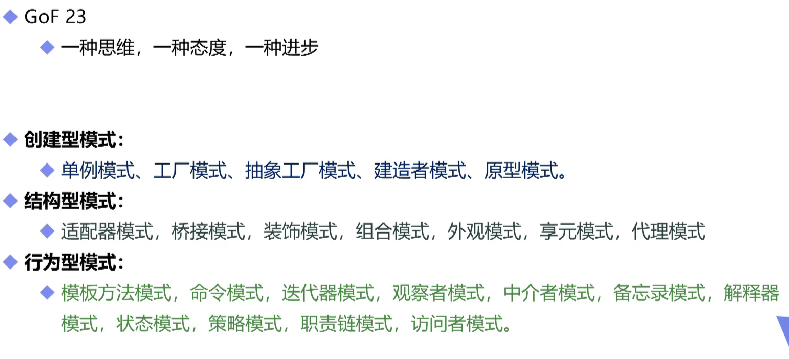
Seven principles of oop
(1) Opening and closing principle: a software entity should be open to expansion and closed to modification;
(2) Richter substitution principle: inheritance must ensure that the properties owned by the superclass are still valid in the subclass
(3) Dependency Inversion Principle: interface oriented programming, not implementation oriented programming.
(4) Single responsibility principle: control the granularity of classes, decouple objects and improve their cohesion.
(5) Interface isolation principle: establish special interfaces for various classes
(6) Dimitri's rule: talk only to your direct friends, not to "strangers".
(7) Principle of composition and reuse: try to use association relations such as combination or aggregation first, and then consider using inheritance relations.
Factory mode
1. Function: realize the separation of creator and caller
2. Seven principles 00P:
(1) Opening and closing principle: a software entity should be open to expansion and closed to modification;
(2) Dependency Inversion Principle: programming for interfaces, not for implementations;
(3) Dimitri's Law: only communicate with your direct friends and avoid communicating with strangers;
3. Core essence:
(1) Instantiated objects do not use new, but use factory methods instead
(2) The implementation class will be selected to create objects for unified management and control. This decouples the caller from our implementation class.

Simple factory mode
1.Car interface
package com.etc.factory.simple;
public interface Car {
void name();
}
2. Wu Ling
package com.etc.factory.simple;
public class WuLing implements Car{
@Override
public void name() {
System.out.println("Wuling");
}
}
3. Tesla
package com.etc.factory.simple;
public class Tesla implements Car{
@Override
public void name() {
System.out.println("Tesla");
}
}
4.CarFactory (create factory)
package com.etc.factory.simple;
//Simple factory mode static factory mode
//Opening and closing principle
public class CarFactory {
//Method 1
public static Car getCar(String car) {
//If you add other classes, you need to modify the following code and modify the logic
if (car.equals("Wuling")) {
return new WuLing();
}else if (car.equals("Tesla")) {
return new Tesla();
}else {
return null;
}
}
//What about adding a car if there is a problem?
//Method 2 without modifying the original logic
public static Car getwuling() {
return new WuLing();
}
public static Car getTesla() {
return new Tesla();
}
}
5.Consumer
package com.etc.factory.simple;
public class Consumer {
public static void main(String[] args) {
// 1 general creation
// Car car1=new WuLing();
// Car car2=new Tesla();
// 2 create using factory
Car car1 = CarFactory.getCar("Wuling");
Car car2 = CarFactory.getCar("Tesla");
car1.name();
car2.name();
}
}
Factory method model
1.car interface
package com.etc.factory.method;
public interface Car {
void name();
}
2.CarFactory interface
package com.etc.factory.method;
//Factory method model
public interface CarFactory {
Car getCar();
}
3. Wu Ling
package com.etc.factory.simple;
public class WuLing implements Car{
@Override
public void name() {
System.out.println("Wuling");
}
}
4. Create a separate WuLingFactory for Wuling
package com.etc.factory.method;
public class WuLingFactory implements CarFactory {
@Override
public Car getCar() {
return new WuLing();
}
}
5. Tesla
package com.etc.factory.simple;
public class Tesla implements Car{
@Override
public void name() {
System.out.println("Tesla");
}
}
6. Create a separate factory for Tesla
package com.etc.factory.method;
public class TeslaFactory implements CarFactory{
@Override
public Car getCar() {
return new Tesla();
}
}
7.Consumer
package com.etc.factory.method;
public class Consumer {
public static void main(String[] args) {
Car car1 = new WuLingFactory().getCar();
Car car2 = new TeslaFactory().getCar();
car1.name();
car2.name();
}
}
Structural complexity: simple
Code complexity: simple
Programming complexity: simple
Management complexity: simple
According to the design principle: factory method mode!
According to the actual business: simple factory mode!
Picture interpretation


Abstract factory pattern


Code demonstration
1.IPhoneProduct interface
//Mobile product interface
public interface IPhoneProduct {
void start();
void shutdown();
void callup();
void sendMS();
}
2.IRouteProduct interface
//Router product interface
public interface IRouteProduct {
void start();
void shutdown();
void openWife();
void setting();
}
3. Xiaomi mobile phone
package com.etc.factory.abstract1;
public class XiaomiPhone implements IPhoneProduct {
@Override
public void start() {
System.out.println("Turn on Xiaomi mobile phone");
}
@Override
public void shutdown() {
System.out.println("Turn off Xiaomi mobile phone");
}
@Override
public void callup() {
System.out.println("Xiaomi called");
}
@Override
public void sendMS() {
System.out.println("Xiaomi sends text messages");
}
}
4. Xiaomi router
package com.etc.factory.abstract1;
public class XiaomiRouter implements IRouteProduct{
@Override
public void start() {
System.out.println("Start Xiaomi router");
}
@Override
public void shutdown() {
System.out.println("Turn off Xiaomi router");
}
@Override
public void openWife() {
System.out.println("Open Xiaomi wifi");
}
@Override
public void setting() {
System.out.println("Set up Xiaomi router");
}
}
5. Huawei Mobile
package com.etc.factory.abstract1;
public class HuaweiPhone implements IPhoneProduct {
@Override
public void start() {
System.out.println("Turn on Huawei mobile phone");
}
@Override
public void shutdown() {
System.out.println("Turn off Huawei mobile phone");
}
@Override
public void callup() {
System.out.println("Huawei calls");
}
@Override
public void sendMS() {
System.out.println("Huawei sends text messages");
}
}
6. Huawei router
package com.etc.factory.abstract1;
public class HuaweiRouter implements IRouteProduct{
@Override
public void start() {
System.out.println("Start Huawei router");
}
@Override
public void shutdown() {
System.out.println("Turn off Huawei router");
}
@Override
public void openWife() {
System.out.println("Start Huawei wifi");
}
@Override
public void setting() {
System.out.println("Set up Huawei router");
}
}
7. Abstract Factory
package com.etc.factory.abstract1;
//Abstract product factory
public interface IProductFactory {
//Production of mobile phones
IPhoneProduct iphoneProduct();
//Production router
IRouteProduct routeProduct();
}
8. Xiaomi factory
package com.etc.factory.abstract1;
public class XiaomiFactory implements IProductFactory{
@Override
public IPhoneProduct iphoneProduct() {
return new XiaomiPhone();
}
@Override
public IRouteProduct routeProduct() {
return new XiaomiRouter();
}
}
9. Huawei factory
package com.etc.factory.abstract1;
public class HuaweiFactory implements IProductFactory{
@Override
public IPhoneProduct iphoneProduct() {
return new HuaweiPhone();
}
@Override
public IRouteProduct routeProduct() {
return new HuaweiRouter();
}
}
10. Client use
package com.etc.factory.abstract1;
public class Client {
public static void main(String[] args) {
System.out.println("=======Xiaomi series products=========");
XiaomiFactory xiaomiFactory = new XiaomiFactory();
IPhoneProduct iPhoneProduct = xiaomiFactory.iphoneProduct();
iPhoneProduct.callup();
iPhoneProduct.sendMS();
IRouteProduct iRouteProduct = xiaomiFactory.routeProduct();
iRouteProduct.openWife();
System.out.println("=======Huawei series products=========");
HuaweiFactory huaweiFactory = new HuaweiFactory();
iPhoneProduct = huaweiFactory.iphoneProduct();
iPhoneProduct.callup();
iPhoneProduct.sendMS();
iRouteProduct = huaweiFactory.routeProduct();
iRouteProduct.openWife();
}
}
Builder pattern
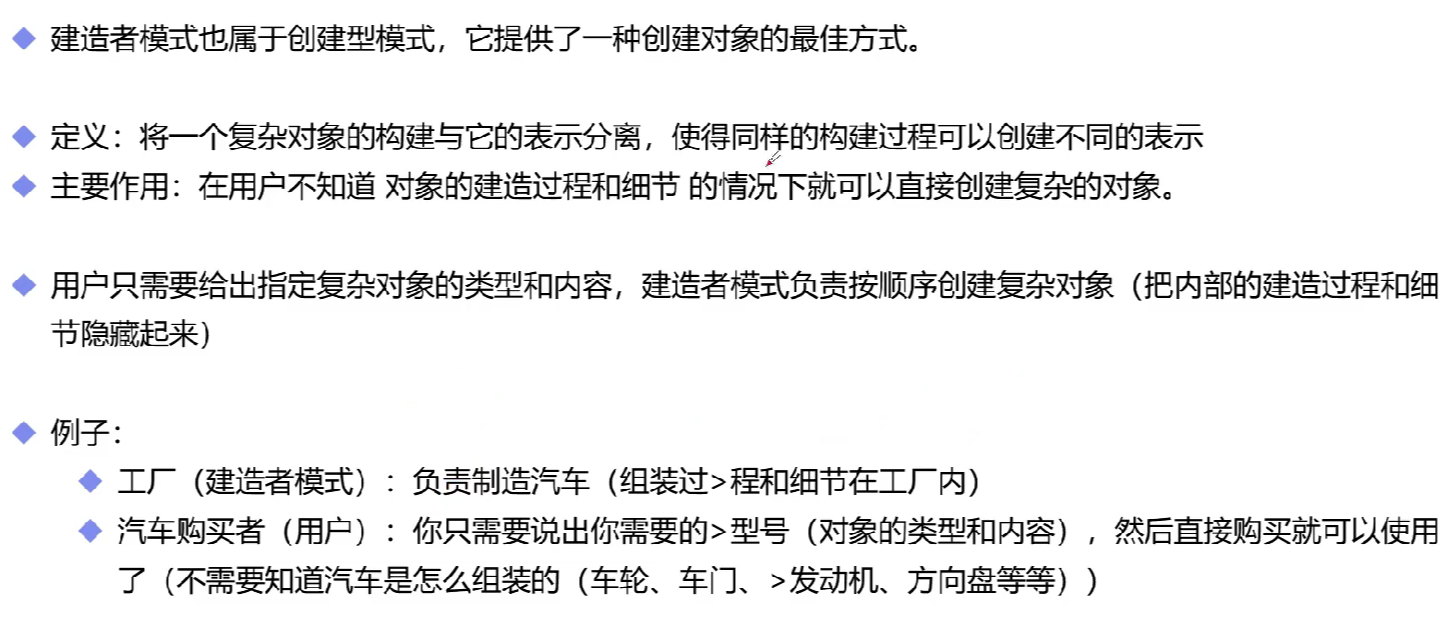
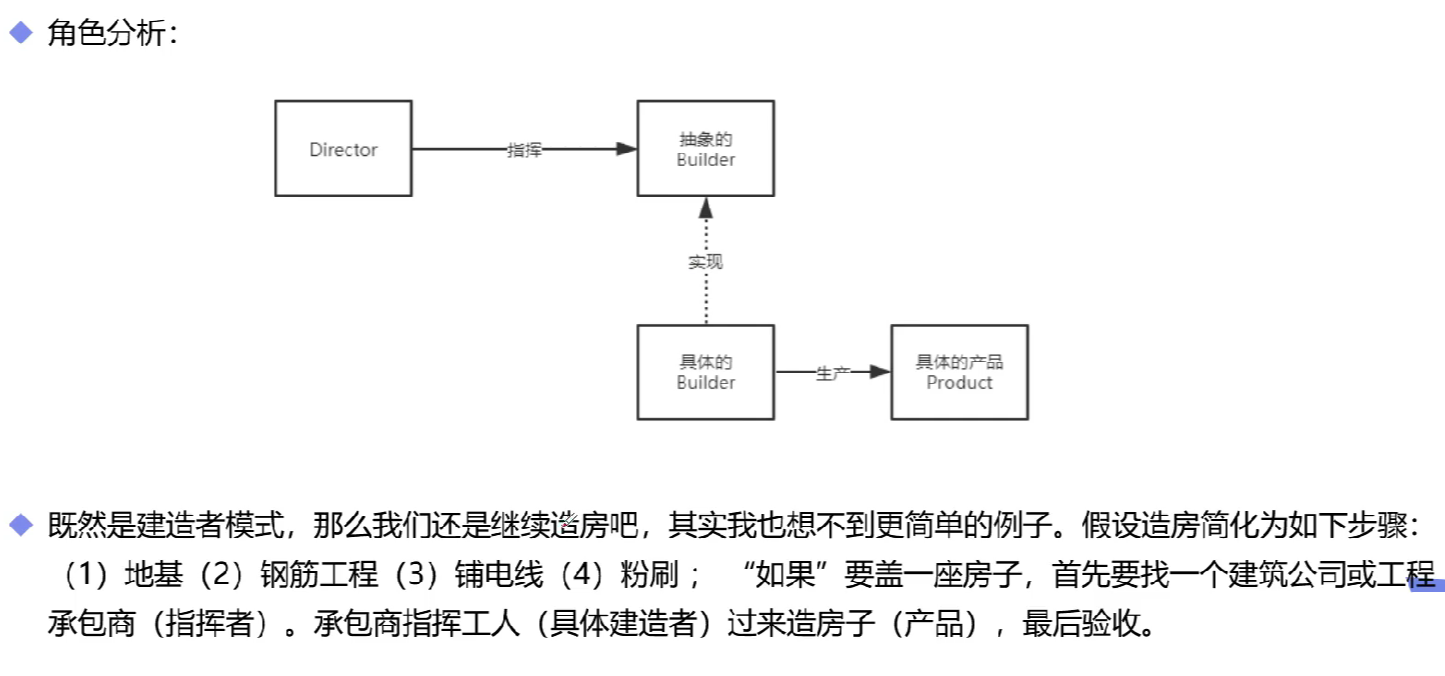
Code demonstration
1. Abstract builder
package com.etc.factory.builder;
//Abstract Builder: method
public abstract class Builder {
abstract void buildA();//foundation
abstract void buildB();//Reinforcement works
abstract void buildC();//Lay wires
abstract void buildD();//Whitewash
//Completion: get the product
abstract Product getProduct();
}
2. Product: House
package com.etc.factory.builder;
//Product: House
public class Product {
private String buildA;
private String buildB;
private String buildC;
private String buildD;
public String getBuildA() {
return buildA;
}
public void setBuildA(String buildA) {
this.buildA = buildA;
}
public String getBuildB() {
return buildB;
}
public void setBuildB(String buildB) {
this.buildB = buildB;
}
public String getBuildC() {
return buildC;
}
public void setBuildC(String buildC) {
this.buildC = buildC;
}
public String getBuildD() {
return buildD;
}
public void setBuildD(String buildD) {
this.buildD = buildD;
}
@Override
public String toString() {
return "Product{" +
"buildA='" + buildA + '\'' +
", buildB='" + buildB + '\'' +
", buildC='" + buildC + '\'' +
", buildD='" + buildD + '\'' +
'}';
}
}
3. Specific builders
package com.etc.factory.builder;
//Specific Builder: Workers
public class Worker extends Builder {
private Product product;
public Worker(){
product=new Product();
}
@Override
void buildA() {
product.setBuildA("foundation");
System.out.println("foundation");
}
@Override
void buildB() {
product.setBuildB("Reinforcement works");
System.out.println("Reinforcement works");
}
@Override
void buildC() {
product.setBuildB("Lay wires");
System.out.println("Lay wires");
}
@Override
void buildD() {
product.setBuildB("Whitewash");
System.out.println("Whitewash");
}
@Override
Product getProduct() {
return product;
}
}
4. Commander
package com.etc.factory.builder;
//Command: the core is responsible for directing the construction of a project. How to build the project is determined by it
public class Director {
//Instruct the workers to build the house in order
public Product build(Builder builder){
builder.buildA();
builder.buildB();
builder.buildC();
builder.buildD();
return builder.getProduct();
}
}
5. Test
package com.etc.factory.builder;
public class Test {
public static void main(String[] args) {
//command
Director director = new Director();
//Direct specific workers to complete the product
Product build = director.build(new Worker());
//The order is determined by the workers
System.out.println(build.toString());
}
}
Code re understanding
1. Builder
package com.etc.factory.builder2;
//builder
public abstract class Builder {
abstract Builder buildA(String msg);//hamburger
abstract Builder buildB(String msg);//cola
abstract Builder buildC(String msg);//French fries
abstract Builder buildD(String msg);//Dessert
abstract Product getProduct();
}
2. Products
package com.etc.factory.builder2;
//Product: package
public class Product {
private String BuildA="hamburger";
private String BuildB="cola";
private String BuildC="French fries";
private String BuildD="Dessert";
public String getBuildA() {
return BuildA;
}
public void setBuildA(String buildA) {
BuildA = buildA;
}
public String getBuildB() {
return BuildB;
}
public void setBuildB(String buildB) {
BuildB = buildB;
}
public String getBuildC() {
return BuildC;
}
public void setBuildC(String buildC) {
BuildC = buildC;
}
public String getBuildD() {
return BuildD;
}
public void setBuildD(String buildD) {
BuildD = buildD;
}
@Override
public String toString() {
return "Product{" +
"BuildA='" + BuildA + '\'' +
", BuildB='" + BuildB + '\'' +
", BuildC='" + BuildC + '\'' +
", BuildD='" + BuildD + '\'' +
'}';
}
}
3. Specific builders
package com.etc.factory.builder2;
//Specific builder
public class Worker extends Builder{
private Product product;
public Worker(){
product=new Product();
}
@Override
Builder buildA(String msg) {
product.setBuildA(msg);
return this;
}
@Override
Builder buildB(String msg) {
product.setBuildB(msg);
return this;
}
@Override
Builder buildC(String msg) {
product.setBuildC(msg);
return this;
}
@Override
Builder buildD(String msg) {
product.setBuildD(msg);
return this;
}
@Override
Product getProduct() {
return product;
}
}
4. Test
package com.etc.factory.builder2;
public class Test {
public static void main(String[] args) {
//waiter
Worker worker = new Worker();
//Chain programming: on the original basis, you can combine freely. If you don't combine, there is also a default package
Product product = worker.buildA("Family bucket")
.buildB("Sprite").getProduct();
System.out.println(product.toString());
//Product{BuildA = 'family bucket', BuildB = 'sprite', BuildC = 'French Fries', BuildD =' dessert '}
}
}
Prototype mode
Code demo demo01
1.Video
package com.etc.prototype.demo01;
import java.util.Date;
/**
* 1.Implement an interface clonable
* 2.Override a method clone()
*/
public class Video implements Cloneable{
private String name;
private Date createTime;
@Override
protected Object clone() throws CloneNotSupportedException {
return super.clone();
}
public Video() {
}
public Video(String name, Date createTime) {
this.name = name;
this.createTime = createTime;
}
public String getName() {
return name;
}
public void setName(String name) {
this.name = name;
}
public Date getCreateTime() {
return createTime;
}
public void setCreateTime(Date createTime) {
this.createTime = createTime;
}
@Override
public String toString() {
return "Video{" +
"name='" + name + '\'' +
", createTime=" + createTime +
'}';
}
}
2.Bilibili
package com.etc.prototype.demo01;
import java.util.Date;
/**
* Clients: cloning
*/
public class Bilibili {
public static void main(String[] args) throws CloneNotSupportedException {
//Prototype object v1
Date date = new Date();
Video v1 = new Video("Madness theory java", date);
Video v2 = (Video) v1.clone();
System.out.println("v1=>"+v1);
System.out.println("v2=>"+v2);
System.out.println("=======");
date.setTime(21312231); //Nothing has changed
System.out.println("v1=>"+v1);
System.out.println("v2=>"+v2);
/*
v1=>Video{name='Crazy God said java', createTime=Sat Feb 19 14:39:15 CST 2022}
v2=>Video{name='Crazy God said java', createTime=Sat Feb 19 14:39:15 CST 2022}
=======
v1=>Video{name='Crazy God said java', createTime=Thu Jan 01 13:55:12 CST 1970}
v2=>Video{name='Crazy God said java', createTime=Thu Jan 01 13:55:12 CST 1970}
*/
}
}
/*
//v1 Clone v2
// Video v2 = new Video("Mad God said java", date);
Video v2 = (Video) v1.clone();
System.out.println("v2=>"+v2);
System.out.println("v2=>hash:"+v2.hashCode());
* v1=>Video{name='Crazy God said java', createTime=Sat Feb 19 14:33:53 CST 2022}
v1=>hash:1028214719
v2=>Video{name='Crazy God said java', createTime=Sat Feb 19 14:33:53 CST 2022}
v2=>hash:500977346
v2.setName("Clone:Crazy God says java ");
System.out.println("v2=>"+v2);
//v2=>Video{name='Clone:Crazy God said java', createTime=Sat Feb 19 14:34:49 CST 2022}
*/

Demo demo02 deep clone
1.Video
package com.etc.prototype.demo02;
import java.util.Date;
public class Video implements Cloneable{
private String name;
private Date createTime;
@Override
protected Object clone() throws CloneNotSupportedException {
Object obj = super.clone();
//Implement deep cloning~
Video v = (Video) obj;
v.createTime = (Date) this.createTime.clone();//Clone the properties of this object as well~
return obj;
}
public Video() {
}
public Video(String name, Date createTime) {
this.name = name;
this.createTime = createTime;
}
public String getName() {
return name;
}
public void setName(String name) {
this.name = name;
}
public Date getCreateTime() {
return createTime;
}
public void setCreateTime(Date createTime) {
this.createTime = createTime;
}
@Override
public String toString() {
return "Video{" +
"name='" + name + '\'' +
", createTime=" + createTime +
'}';
}
}
2.Bilibili
package com.etc.prototype.demo02;
import java.util.Date;
//Prototype mode + factory mode = = "new" = "prototype mode
public class Bilibili {
public static void main(String[] args) throws CloneNotSupportedException {
//Prototype object v1
Date date = new Date();
Video v1 = new Video("Madness theory java", date);
Video v2 = (Video) v1.clone();
System.out.println("v1=>"+v1);
System.out.println("v2=>"+v2);
System.out.println("=======");
date.setTime(21312231);
System.out.println("v1=>"+v1);
System.out.println("v2=>"+v2);
/*
v1=>Video{name='Crazy God said java', createTime=Sat Feb 19 14:43:22 CST 2022}
v2=>Video{name='Crazy God said java', createTime=Sat Feb 19 14:43:22 CST 2022}
=======
v1=>Video{name='Crazy God said java', createTime=Thu Jan 01 13:55:12 CST 1970}
v2=>Video{name='Crazy God said java', createTime=Sat Feb 19 14:43:22 CST 2022}
*/
}
}
Adapter mode


Code demonstration
1.Adaptee
package com.etc.adapter;
//Class to be adapted: network cable
public class Adaptee {
public void request(){
System.out.println("Connect the network cable to the Internet");
}
}
2.NetToUsb
package com.etc.adapter;
//Abstract implementation of interface converter
public interface NetToUsb {
//Function: handle request network cable = "usb"
public void handleRequest();
}
3.Adapter
package com.etc.adapter;
//The real adapter needs to be connected with USB and network cable
//Inheritance (class adapter inheritance)
//Combination (object adapter: common)
public class Adapter extends Adaptee implements NetToUsb{
@Override
public void handleRequest() {
super.request();//You can surf the Internet
}
}
4.Computer
package com.etc.adapter;
//Client class: if you want to surf the Internet, you can't plug in the network cable
public class Computer {
//Our computers need to be connected to an adapter to access the Internet
public void net(NetToUsb netToUsb){
//Specific implementation of Internet access ~ find an adapter
netToUsb.handleRequest();
}
public static void main(String[] args) {
//Computer adapter cable
Computer computer = new Computer();
Adaptee adaptee = new Adaptee();
Adapter adapter = new Adapter();
Adapter2 adapter2=new Adapter2(adaptee);
// computer.net(adapter);
computer.net(adapter2);
}
}
Upgraded Adapter2
package com.etc.adapter;
//The real adapter needs to be connected with USB and network cable
//Inheritance (class adapter inheritance)
//Combination (object adapter: common)
public class Adapter2 implements NetToUsb{
private Adaptee adaptee;
public Adapter2(Adaptee adaptee) {
this.adaptee = adaptee;
}
@Override
public void handleRequest() {
adaptee.request();
}
}
Bridging mode
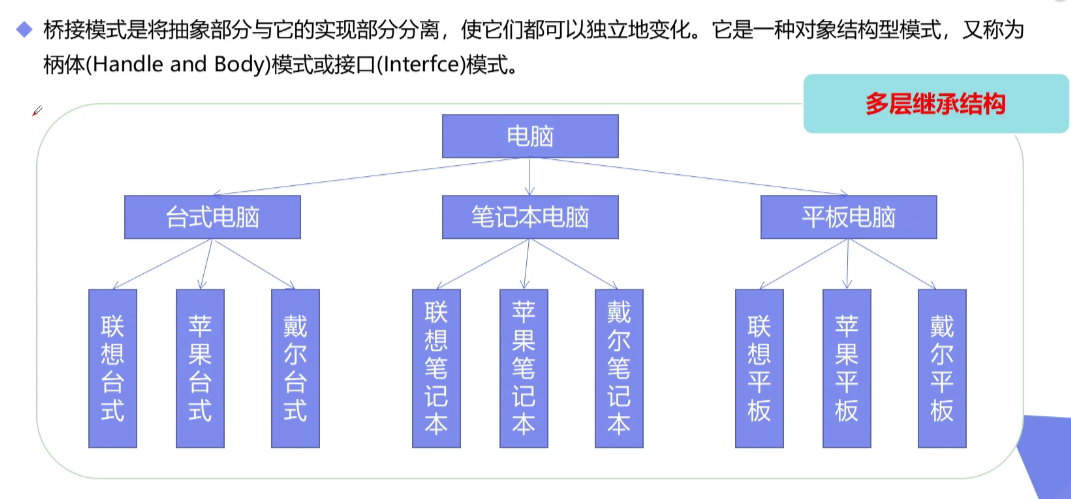


Code demonstration
1.Brand
package com.etc.bridge;
//brand
public interface Brand {
void info();
}
2.Lenovo Lenovo brand
package com.etc.bridge;
//Lenovo brand
public class Lenovo implements Brand{
@Override
public void info() {
System.out.print("association");
}
}
3. Apple brand
package com.etc.bridge;
//Apple brand
public class Apple implements Brand{
@Override
public void info() {
System.out.print("Apple");
}
}
4. Combination
package com.etc.bridge;
//Abstract computer type class
public abstract class Computer {
//Combined brand
protected Brand brand;
public Computer(Brand brand) {
this.brand = brand;
}
public void info(){
brand.info();//Own brand
}
}
class Desktop extends Computer{
public Desktop(Brand brand) {
super(brand);
}
@Override
public void info() {
super.info();
System.out.print("Desktop");
}
}
class Laptop extends Computer{
public Laptop(Brand brand) {
super(brand);
}
@Override
public void info() {
super.info();
System.out.print("notebook");
}
}
5. Test
package com.etc.bridge;
public class Test {
public static void main(String[] args) {
//Apple notebook
Computer computer = new Laptop(new Apple());
computer.info();
System.out.println();
//Lenovo desktop
Computer computer2 = new Desktop(new Lenovo());
computer2.info();
}
}